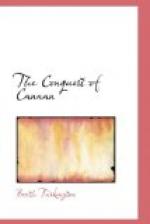The Tocsin did not print the interview it obtained from Louie Farbach—the same Louie Farbach who long ago had owned a beer-saloon with a little room behind the bar, where a shabby boy sometimes played dominoes and “seven-up” with loafers: not quite the same Louie Farbach, however, in outward circumstance: for he was now the brewer of Farbach Beer and making Canaan famous. His rise had been Teutonic and sure; and he contributed one-twentieth of his income to the German Orphan Asylum and one-tenth to his party’s campaign fund. The twentieth saved the orphans from the county, while the tithe gave the county to his party.
He occupied a kitchen chair, enjoying the society of some chickens in a wired enclosure behind the new Italian villa he had erected in that part of Canaan where he would be most uncomfortable, and he looked woodenly at the reporter when the latter put his question.
“Hef you any aguaintunce off Mitster Fear?” he inquired, in return, with no expression decipherable either upon his Gargantuan face or in his heavily enfolded eyes.
“No, sir,” replied the reporter, grinning. “I never ran across him.”
“Dot iss a goot t’ing fer you,” said Mr. Farbach, stonily. “He iss not a man peobles bedder try to run across. It iss what Gory tried. Now Gory iss dead.”
The reporter, slightly puzzled, lit a cigarette. “See here, Mr. Farbach,” he urged, “I only want a word or two about this thing; and you might give me a brief expression concerning that man Louden besides: just a hint of what you think of his influence here, you know, and of the kind of sharp work he practises. Something like that.”
“I see,” said the brewer, slowly. “Happy Fear I hef knowt for a goot many years. He iss a goot frient of mine.”
“What?”
“Choe Louten iss a bedder one,” continued Mr. Farbach, turning again to stare at his chickens.
“Git owit.”
“What?”
“Git owit,” repeated the other, without passion, without anger, without any expression whatsoever. “Git owit.”
The reporter’s prejudice against the German nation dated from that moment.
There were others, here and there, who were less self-contained than the brewer. A farm-hand struck a fellow laborer in the harvest-field for speaking ill of Joe; and the unravelling of a strange street fight, one day, disclosed as its cause a like resentment, on the part of a blind broom-maker, engendered by a like offence. The broom-maker’s companion, reading the Tocsin as the two walked together, had begun the quarrel by remarking that Happy Fear ought to be hanged once for his own sake and twice more “to show up that shyster Louden.” Warm words followed, leading to extremely material conflict, in which, in spite of his blindness, the broom-maker had so much the best of it that he was removed from the triumphant attitude he had assumed toward the person of his adversary, which was an admirable




